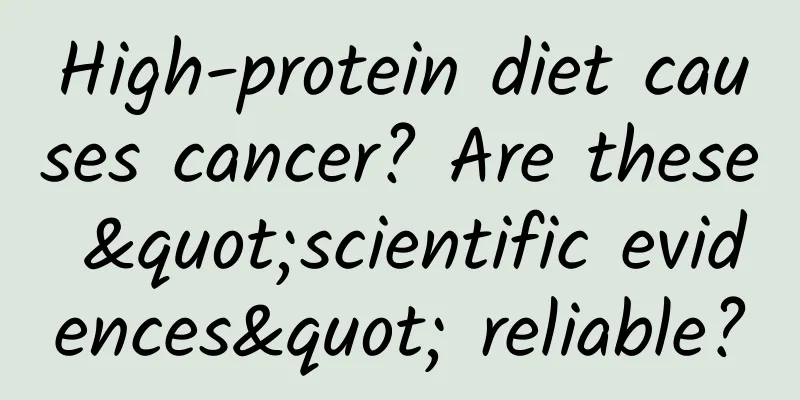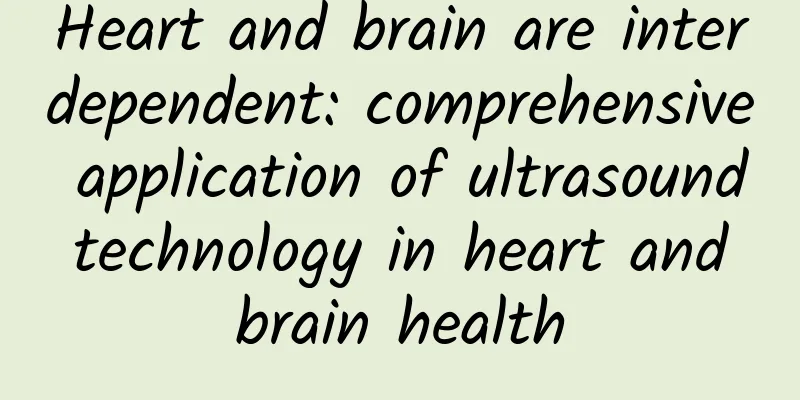High-protein diet causes cancer? Are these "scientific evidences" reliable?

|
Real points: There is no clear scientific evidence to prove that "a high-protein diet causes cancer". Rather than the protein content in the diet, we should pay more attention to the source of protein. If you need to supplement protein, it is recommended to give priority to grains such as soybeans, followed by poultry, aquatic products and eggs, and eat less red meat and processed meat products. Verified by: Yun Wuxin | Doctor of Food Engineering People always take the attitude of "better believe it" to various "dietary cancer warnings", and would rather give up delicious food than be exposed to the slightest risk. Recently, the saying that "high-protein diet causes cancer" has once again spread on the Internet, and the advocates can also list a lot of "scientific evidence" that makes it difficult for ordinary people to distinguish the truth from the false. Before starting the analysis, let me tell you the conclusion: "High-protein diet causes cancer" is not reliable! Why is it not reliable? Let the experts tell you in detail. 1. The legend of "high protein causes cancer", an animal experiment study that was misinterpreted Campbell, a famous professor of nutrition at Cornell University in the United States, once wrote a best-selling book called "China Health Survey Report". The book introduced an experiment, and its conclusion was: feeding mice with high casein feed would promote the occurrence of liver cancer in mice; replacing casein with plant protein would not have the same result. This experiment was then used by vegetarians and animal protection organizations, and gradually evolved into "scientific evidence" that "high protein causes cancer." But in fact, this experiment cannot draw the conclusion that "high protein causes cancer" or "casein causes cancer". First of all, the mice used in the experiment have been induced by aflatoxin to produce cancer cells, and they are not normal mice; secondly, casein is the only source of protein in the diet of the experimental mice. These two points are very different from a normal diet. In addition, the research results of mouse experiments cannot be directly applied to humans. In short, this study is only of scientific research value and cannot be used as a guide for life, let alone as a basis for supporting the "high-protein diet causes cancer." 2. “Barbecue causes cancer”, this blame should not be placed on high protein Another saying about "high protein causes cancer" is derived from "barbecue causes cancer". When grilling meat, heterocyclic amines and polycyclic aromatic hydrocarbons may be produced, such as the well-known benzopyrene. The results of experimental animals and in vitro cell experiments show that benzopyrene has certain carcinogenicity, and meat is a high-protein food. Somehow, it has become the basis for the "high-protein diet causes cancer". In fact, the production of heterocyclic amines and benzopyrene and other substances is mainly due to the word "grilled" in grilling, not the word "meat". As long as the meat is grilled, it is inevitable that benzopyrene and other substances will be produced. In addition to meat, grilling other foods is also the same. Therefore, the carcinogenicity of red meat has nothing to do with the high or low protein content of red meat. If you want to avoid consuming too much benzopyrene, you need to be careful to avoid exposing the meat to open flames when grilling, reduce the amount of oil dripping into the fire, turn the meat over frequently to avoid local overheating, use an electric grill, etc. With other cooking methods, such as stewing, boiling, steaming, stir-frying, etc., the meat will not come into direct contact with fire and will not reach such high temperatures, so there is no need to worry about the issue of "producing carcinogens". 3. Do red meat and processed meat products cause cancer? Increasing the risk of cancer and "getting cancer after eating" are two different things There is indeed a lot of scientific evidence that red meat (such as pork, beef and lamb) increases the risk of certain cancers. In particular, the evidence that processed meat products (such as ham, bacon, sausage, bacon, etc.) increase the risk of cancer is even more conclusive. Since meat is an excellent source of protein, it is easy to associate it with the saying that "high-protein diet causes cancer." But in fact, it can only be said that the consumption of red meat increases the risk of cancer due to factors such as the processing of red meat and the products of the reaction in the body after eating red meat, but it cannot be said that the risk of cancer increases because red meat contains protein. In addition, "can increase the risk of cancer" and "will cause cancer if eaten" are two different things. For example, a study showed that girls who ate 1.5 servings of red meat (about 125 grams) a day in high school had a 22% increased risk of breast cancer compared to girls who only ate one serving a week. In other words, if the risk of breast cancer in women is 1%, then eating 125 grams of red meat a day will increase this risk to 1.22%. 4. How should we eat protein? The above foods that "may be related to cancer" contain other substances in addition to protein, and it cannot be proved that a high-protein diet will cause cancer. When scientists explain the reasons why these foods are related to cancer, they also indicate that it has nothing to do with protein. In fact, studies have shown that a "low-carb, high-protein" diet may inhibit the occurrence of some cancers. Compared with protein intake, we should be more concerned about the source of protein. The Harvard School of Public Health's recommendation for protein from different sources is ranked (from best to worst): 1. Plant Protein 2. Poultry, aquatic products and eggs 3. Dairy products 4. Red meat 5. Processed meat Soybeans, quinoa, potatoes, etc. are all good sources of plant protein. If you need to supplement protein, it is recommended to give priority to grains such as soybeans, followed by poultry, aquatic products and eggs, and then dairy products. At the same time, you should also pay attention to ensuring the richness of the intake of vegetables. Finally, eat less red meat and processed meat products. Editor of this article: yutonggliu |
Recommend
Can I have a natural birth after multiple miscarriages?
There is not much correlation between the number ...
A small bag on the vulva?
The appearance of small lumps on the vulva is lik...
Adding ice to drinks: is it a cool surprise or a feast for bacteria?
Summer solstice has not yet arrived, but the heat...
Can massage cure breast hyperplasia?
Breast massage can prevent breast hyperplasia, bu...
Hip joint strength training (I)
1. Hip external rotation training using elastic b...
How long will it take to give birth if the water breaks at full term
When a pregnant woman is about to give birth, the...
Do breasts get bigger during ovulation?
If women have sex during their ovulation period, ...
Both nipples hurt, is it pregnancy?
Women who are preparing for pregnancy are very se...
What is the problem with the yellowing leaves of Strelitzia? How to treat the yellowing leaves of Strelitzia?
Strelitzia is a common flower in life. It is deep...
What should I do if I have bloating during pregnancy?
Many pregnant women will encounter various proble...
What to do when you are 40 years old and in menopause
A woman's life goes through the fetal period,...
This super sour fruit can be found in many places, but only people in Jiangxi can let you taste its deliciousness!
When you think of sour jujube, what image comes t...
How can pregnant women grow the baby without gaining weight?
During pregnancy, expectant mothers fall into a r...
Are bigger breasts better for women? Uncover 10 private questions about women's breasts
Are bigger breasts better for women? According to...


![[Medical Q&A] Which lung cancer patients are suitable for targeted therapy?](/upload/images/67f0e63b001cb.webp)






